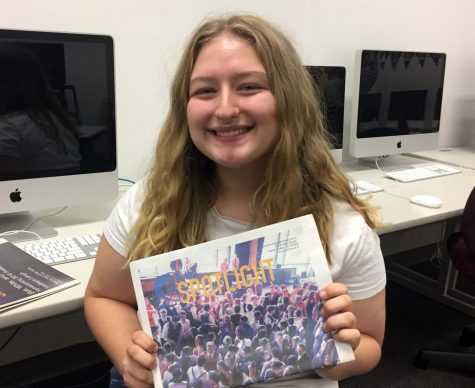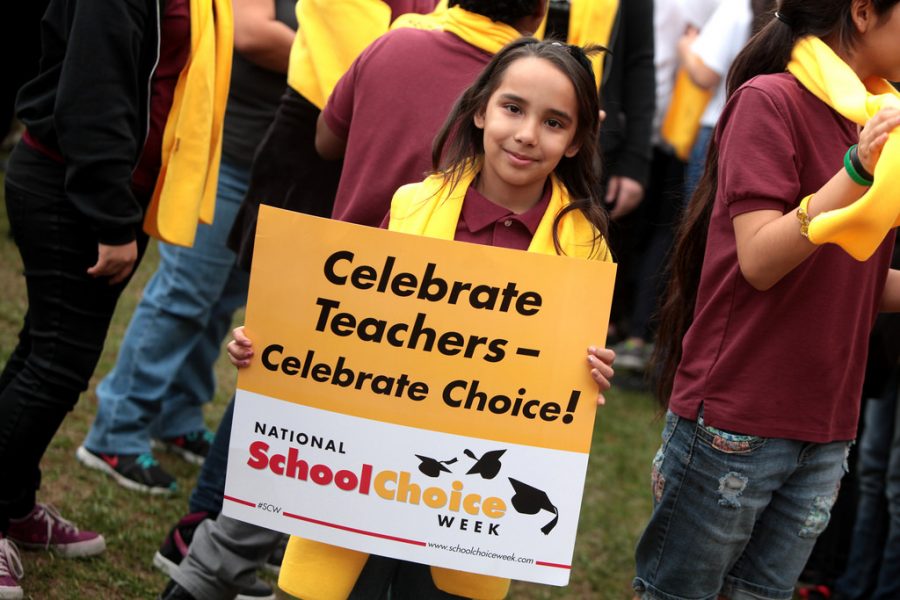Dangers of Privatizing Education
A student attends a School Choice Week rally in Phoenix, Arizona.
The educational world as we know it has always provided many options for places of learning, whether students attend a public, private, or charter school. An education initiative that has slowly been growing through the years seeks to provide even more choices by completely privatizing education and taking out public education altogether. Various organizations, such as EdChoice and the Foundation for Excellence in Education, as well as many politicians like Betsy DeVos, the newly confirmed U.S. Secretary of Education, are spearheading this movement, but there are several flaws in their plans.
“I think public schools are better than private schools. I think public schools mold us more; they shape us into who we are as teenageers and who we are going to be as young adults,” senior Sarah Erie said. “Not that private schools don’t do that; there’s just more experiences [in public schools], and there’s more people to connect and contrast with.”
At first glance, the prospect of being provided more schooling choices may seem like a grand idea, but for many students in rural areas, this will not be the case. According to the United States Census Bureau, 19.3 percent of the U.S. population lived in rural areas in 2016, but 97 percent of the nation’s land area is considered to be rural. With such a wide, sparsely populated area, getting the promised array of choices will be difficult.
“I think if there’s at least more than one [private] school I don’t really think it would affect [students in rural areas] because I don’t think it would be that much different than going to public school,” sophomore Micah Silver, a former Southern Lehigh student who currently attends a charter school, said.
While organizations like EdChoice argue that rural students can simply turn to online charter schools, the Center for Research on Education Outcomes at Stanford University found that compared to public school students, online charter students lost 72 days of learning in reading per school year, and 180 days, or the entire school year, in math. These schools may be an option, but for students in these rural areas who strive for academic success, they aren’t viable.
The United States Census Bureau also reported that in 2015, the official poverty rate was 13.5 percent. According to Healthcare.gov, the poverty threshold for a family of four is $24,300, while the Private School Review estimates that private high schools cost $13,538 a year on average. Privatizing education would mean that cheaper options would need to be available to these families, but it also means that some families will not be able to afford education no matter how cheap tuition is.
This will cause inequity in the quality of education students receive, since only some people will be able to pay the $13,538 a year to private schools. There is a proposed voucher system that would provide students with a certain amount of money, but there are two main problems with the setup.
First, the Council for American Private Schools reports that 80 percent of students who attend private school attend a religiously affiliated school, and the United States Department of Education reports that 67.9 percent of private schools have religious affiliations in 2008. If the education system were privatized, than the government would be providing these schools with funding through the voucher program. This calls into question whether or not that violates the idea of separation of church and state.
The Supreme Court ruled that school vouchers do not violate the United States constitution, and therefore do not violate separation of church and state. However 38 out of the 50 states have an amendment in their constitutions called the Blaine Amendment. This amendment does not allow the government to fund religiously-affiliated schools schools, and thus funding religious schools through the voucher system violates those 38 state constitutions.
“I do feel as though there would be a violation of separation of church and state if we eliminated public schools,” senior Izzy Diaz said. “[Religious schools] should be a separate entity.”
Second, in some states and cities that have instituted a voucher system, such as Milwaukee, Wisconsin, they have found that not every private school accepts the vouchers. The National Coalition for Public Education reports that private schools may reject voucher students due to economic status, gender, religion, or disability. The voucher program does not, in fact, allow true choice, and can limit some students’ options.
“Currently, the voucher programs that are offered in 14 states have certain requirements: some require the student to have an IEP or a disability to participate. Others require that they have attended a public school with a ‘D’ or ‘F’ rating,” Central Bucks School District ESL teacher Mrs. Ashley Leech said. “While I certainly agree that students need to be offered the same opportunities, we need to see the forest for the trees and re-examine how and why we think that voucher programs are a viable answer.”
Many proponents of privatizing education argue that the competition for students will improve the quality of schools and the education they provide. However, in an interview with Harvard University’s Usable Knowledge online platform, educational economist Joshua Goodman discussed why this is not true.
His main point was that education was unlike other products a consumer might purchase. You can not evaluate its value until after you have provided the money. The competition between private schools does not improve the quality of the schools like a rivalry between two restaurants might. This makes the voucher system even more unappealing, because once the money is spent, you cannot take your money back and spend it elsewhere.
“I think that [privatizing] would hurt education,” social studies teacher Mrs. Jennifer Wlodek said. “In the respect that, just like a business can run however they want, the school can run however they want.”
Private schools can attract frauds and other con artists looking for money. There are many instances of people creating fake companies in order to embezzle from their own school, or entire schools being fabricated. One such instance occurred in Tampa Bay, Florida, where the Tampa Bay Times reported an administrator from a local charter school stole more than $100,000 from The Schools of McKeel Academy.
According to The Washington Post, it was discovered that $200 million of taxpayer funds meant for charter schools were stolen or misused. However, they admitted that the number may be higher because there is no way to know how many people have yet to be caught. The necessary tools to catch the crooks are expensive and require hefty legislation that might be difficult to pass, as it may be seen as an attack on the schools.
This article is in no way meant to attack private schools, but rather dissect the negatives of having an education system that is entirely privatized. Public schools, while needing various improvements, are vital to student success, and when searching for ways to improve the quality of education for our students, we should not look to private institutions to entirely solve the problem. Instead of relying on other people to clean up the government’s mess, officials should look towards bettering public schools so that all students have access to fair, equal, and accessible education.

Senior Sarah Jacobson is a third-year staff reporter, former Our World editor, and current Editor-in-Chief of the Spotlight. She is also the head of social...


